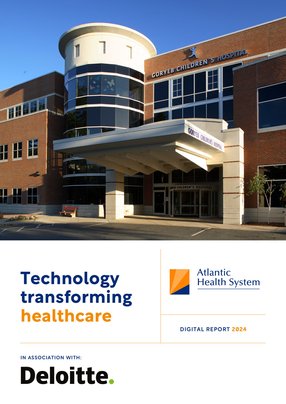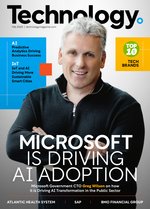No industry is arguably as disrupted today as the healthcare sector. From implementation of new, cutting-edge technologies such as AI and extended reality to tackling ever-increasing cybersecurity threats and adhering to regulatory requirements, healthcare organisations are facing no end of challenges.
One of the largest non-profit health care networks operating in the tri-state area of New Jersey, Pennsylvania and New York, Atlantic Health System is powered by approximately 19,000 team members with 5,440 affiliated physicians, and serves more than six million community members and consumers.
The health system provides a full care continuum to meet the health needs of its communities with six nationally recognised hospitals, 400-plus ambulatory sites, urgent cares, telehealth, rehab institutions and visiting nurses, with a core mission to design and deliver the highest quality of innovative and personalised healthcare to build healthier communities and improve lives of patients, consumers and caregivers, thereby making healthcare more affordable, accessible and equitable.
Helping Atlantic Health achieve these goals is Sunil Dadlani, its Chief Information and Digital Officer, who is responsible for leading and driving the organisation’s digital transformation and technology innovations.
“We can see firsthand how technology advancements are really making inroads in every facet of the healthcare industry, starting from diagnostics to preventive care to early treatments, precision medicine and personalised medicine,” he describes. “In every single area from revenue cycle management, patient experience and engagement, technology touches almost every single facet of the healthcare industry.”
Atlantic Health System: Fast-paced digital transformation
Since joining Atlantic Health System in 2020, Dadani describes the organisation’s significant evolution and growth, both in terms of technology adoptions as well as healthcare delivery.
“Some of the key areas of change are our pace and acceleration of digital transformation in all areas of care and implementing state-of-the-art technologies: whether it's cloud technologies, mobile technologies, wearable sensors or Internet of Medical Things devices, state-of-the art EHR systems, CRM systems and ERP systems,” he says.
Significant strides have also been made in terms of improving patient engagement and patient experience through Atlantic Health System’s state-of-the-art patient portal and mobile apps, making healthcare more real-time. “We have made significant investments in terms of ensuring that in the areas of cloud-based analytical platforms,” Dadlani explains. “We are now leveraging AI and analysing this data and innovating in terms of quality care in research areas and in terms of new therapies.”
Describing it as one of the healthcare industry’s main challenges, Atlantic Health’s approach to cybersecurity has also evolved in recent years. “Healthcare organisations are prime targets for cybersecurity threats because of the sensitive and valuable patient data that we hold. With this comes a large responsibility to stay compliant, to meet the regulatory mandates and, most importantly, to maintain the trust of the patients and of our team members.”
How cross-functional teams help Atlantic Health System solve problems
When it comes to tackling these challenges, Atlantic Health recognises the value of diverse perspectives in problem-solving. Cross-functional teams, Dadlani describes, contribute to a more holistic approach to identifying and addressing challenges.
“Involving cross-functional teams in problem solving is a crucial strategy for Atlantic Health, particularly in a dynamic environment like a healthcare system, which is always evolving and which is always changing,” he explains. “So, it's fundamental to us that we involve cross-functional teams to get a diverse view.”
Some of the key comprehensive advantages of having a cross-functional team member's input is having a different view when you start with defining the problem. “We don't want to solve the problem just from our own perspective, but having a cross-functional view. That leads to designing and building and implementing solutions that cover various aspects when we define the problem with the multi-view.”
This method also helps in securing buy-in from executive leadership. “It promotes cross-functional engagement, it improves knowledge sharing and learning, and it involves cross-functional risk management because risks do not pertain to only one function,” Dadlani clarifies.
“It also promotes innovation and, most importantly, it promotes alignment with the organisation goals that we are trying to solve.”
The role of telehealth at Atlantic Health System
Telehealth emerged as a pivotal aspect of Atlantic Health’s strategy, particularly during the COVID-19 pandemic. It expanded access to care for remote and underserved communities, enhancing patient experience and convenience.
As Dadlani describes, Atlantic Health’s robust and expansive telehealth programme solves many challenges like, first of all, expanding access to care.
“We are able to provide care to the community members that are remote or in underserved areas,” he says. “That is most important for us: touching as many lives and making it more equitable.”
Telehealth can also be utilised to enhance patient experience and convenience. “Many times – maybe because of the weather, because of travel times or wait times – it's easier to offer telehealth services, because this is what consumers are demanding. It enables us to meet consumers where they are, providing healthcare that is convenient and that is available for extended hours, irrespective of location or device.”
With the rising cost of healthcare in the US, the telehealth approach also presents a cost-effective solution for patients, and helps reduce the burden on physical healthcare facilities, allowing for more efficient resource allocation.
“The rising cost of healthcare is unsustainable, so telehealth is one of the key ways that we can provide care and make it more accessible and make it more affordable,” Dadlani comments.
“It also has a major advantage that it reduces the strain on healthcare facilities like emergency departments. There are many times where you can provide care via telehealth care delivery models, freeing up resources and treating high acuity patients. So, it's a win on both sides.”
Digital HR and finance solutions transforming employee experience
Atlantic Health System’s adoption of digital tools in HR, finance and supply chain management has resulted in significant operational improvements. The implementation of the Oracle Cloud ERP platform, together with partner Deloitte, has been central to this transformation, enabling automation and adherence to best practices.
“Deloitte has been our trusted partner in our digital transformation journey for finance, supply chain and human resources,” Dadlani explains. “Deloitte really brings extensive expertise in terms of healthcare expertise and in terms of technological expertise, especially in our journey with the Oracle ERP Cloud implementation.”
“Business processes are now based on best practices. They are standardised, integrated and automated, reducing the workload on team members,” Dadlani comments. “Then we offer employee wellness programmes, through human capital management modules, such as stress management courses, mental health support and fitness tracking. This has really been received very positively by our own team members.”
Atlantic Health has also implemented feedback and engagement platforms, to enable deeper insights into employee morale, employee workload and – most importantly – implementing timely interventions.
“Our employee self-service portals use automation to streamline tasks such as leave applications, expenses and benefits can be done more efficiently and reduce the burden on the HR and finance department. It brings more collaboration, and the ERP cloud implementation also brings real-time visibility into the entire health system's operations, so that we can take proactive measures in any areas which require improvements,” Dadlani explains.
“Then most importantly is our reward and recognition programme,” he adds. “We have an additional platform that facilitates reward and recognition for all the hard work and achievements that the staff members are doing and boosting their morale and reducing burnout.”
Atlantic Health System and AI: From easing physician burnout to improving diagnostic accuracy
Addressing physician burnout, a significant concern in healthcare, Atlantic Health has employed generative AI effectively. This technology has been transformative in clinical documentation, easing the burden on physicians. “Physician burnout is real, and we have seen this through many KPIs that we measure.”
With clinical documentation being one of the largest core areas which causes burnout, Atlantic Health is using generative AI to reduce the time spent by physicians on documentation, by automatically generating medical notes, reports and patient summaries. “This must be of course finally reviewed by the physician, but it has a tremendous impact in reducing physician burnout,” Dadlani describes.
Atlantic Health System also uses gen AI-enabled clinical decision support systems, including diagnostic suggestions, potential treatment plans, and even identifying drug interactions to ease cognitive load on physicians.
Use cases such as this form part of a wider AI strategy at Atlantic Health, with the technology having a huge potential to revolutionising and re-imagine healthcare, making it more patient-centric, efficient, real-time and data-driven.
“At Atlantic Health System, we have really doubled down in terms of our investment efforts in leveraging AI in different parts of the organisation, whether it's a clinical area or in the nonclinical area,” Dadlani explains.
One area where Atlantic Health is using AI extensively is to improve diagnostic accuracy. “AI has made significant strides in terms of imaging area,” he says. “There is an acute shortage of radiologists, so we are using AI in terms of initial reads of imaging, prioritising those reads, notifying the radiologist or the physicians for early intervention, and even for preventive care. That has made a significant impact in terms of prioritising care and early interventions, leading to better patient outcomes and patient safety.”
AI is also being used in terms of enhanced patient care. “AI monitors patient conditions in real-time using remote patient monitoring, and alerts the care team if there is any early intervention needed,” Dadlani explains.
“Then of course, AI is also extensively used in clinical decision support systems, making personalised education training materials, and also in terms of predictive health and public health area where we are using AI to leverage large data sets to identify disease patterns, outbreaks, assist in public health surveillance and preventive strategies. We are exploring use cases for leveraging AI in personalised and precision medicine.”
Atlantic Health System: A laser focus on innovation and transformation
Looking ahead, Atlantic Health is committed to furthering its innovation and digital transformation initiatives.
“Over the next 12 to 18 months, Atlantic Health System is laser-focused on continuing our efforts with a strong focus on innovation and digital transformation as a core strategic goal,” Dadlani concludes.
“We are going to double down in our additional transformation and innovation journey,” he adds, “making a difference and creating our competitive advantage and leadership position in all aspects of healthcare: from patient experience and engagement to patient outcome, patient safety, and also improving operational efficiencies, financial performance and making huge strides in population health.”
Make sure you check out the latest edition of Technology Magazine and also sign up to our global conference series - Tech & AI LIVE 2024
**************
Technology Magazine is a BizClik brand




- Deloitte: Delivering Cloud ERP for Higher EducationCloud & Cybersecurity
- Deloitte: Delivering Cloud ERP for Higher EducationCloud & Cybersecurity
- Deloitte Streamlines Atlantic Health System’s Cloud AdoptionCloud & Cybersecurity
- Deloitte Streamlines Atlantic Health System’s Cloud AdoptionCloud & Cybersecurity


